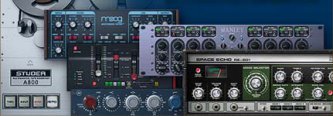 |
 |
 |
What is Mastering?Exactly what is Mastering? As a studio owner and mastering engineer that is a question that I am asked all the time. For many people it seems to be some mysterious process that they can't quite wrap their head around, that somehow magically makes everything sound better. Allow me to shed some light on the matter and hopefully answer the question once and for all for many of you. In short, mastering is the final step of the recording studio process that brings the final work up to master-quality, radio-ready, commercial standards. In plain talk, it is doing whatever it takes to make the audio sound as good as possible. It is usually a rather straightforward procedure, and mostly involves the same techniques that most musicians are already familiar with in the recording studio from mixing. Nine times out of ten, mastering is simply using EQ and compression and/or limiting to make the music sound like a commercial release as far as tonal balance and volume are concerned. Now mastering can also include the programming of spacing and start markers on a full length cd, as well as the embedding of ISRC codes, but that's a secondary aspect of it and in many instances not even performed since a lot of music is not part of an album or is not in need of an ISRC code. So this article will focus only on the primary roll of audio enhancement. What a song needs in order to be brought up to the aforementioned commercial standards can vary greatly. Hence the mastering process can be very different from one project to the next, and I believe that that's one of the reasons why many people are confused about exactly what mastering is. To start a session, the mastering engineer must listen to a mix and ask himself, "what does this need?" Sometimes it needs hardly anything at all, and sometimes it needs a LOT, and in those cases the mastering engineer must then try to fix or compensate for oversights made during mixing. 
Sometimes a mix is so well-done (not too often mind you) that it needs absolutely nothing except possibly to be made louder through limiting (a form of compression) so that it is the same volume as other commercial releases in its genre. Some genres are louder than others (hip-hop, or metal have a far louder average volume than say singer-songwriter or jazz). So making a recording appear louder is mastering at its simplest. But much more often than that a song needs more "sculpting" to sound it's best, and that's when the engineer introduces things like equalizers and other frequency dependent tools, possibly along with compression to enhance the piece before making it louder. I'd say most mastering falls into this category. Many of these tools are the same ones used during mixing, and some are very similar, but only tweaked to work especially well on a stereo mix. To over-simplify, it's like turning the bass and treble and volume controls on your home stereo up or down until you like the way it sounds. However mastering can go way deeper if need be. In addition to these tools, you can use almost any other effect that's used in mixing. Sometimes a reverb or a flanger in a certain portion of a song is just the ticket. Also the engineer can help correct issues with phase, stereo width, digital artifacts or noise within a song if need be. It's in those cases where he can reach into his bag of tricks and use tools unfamiliar to most musicians. 
Apart from the mechanics of making music louder or have a pleasing tonal balance, good mastering can actually enhance the emotional delivery of a song, making the acoustic footprint sound more appropriate for the intended emotion, and thereby intensifying the emotional experience of the listener - and that's when a great mastering engineer is a great artist as well. As you may have surmised by now, the most important tools when it comes to mastering are one's ears. The ability to hear a song and know exactly what it needs to be brought to the next level is something that no amount of equipment or money can compensate for. It is a true talent that only comes with years of experience spent passionately and intently listening to, and analyzing, music in the greatest detail. |